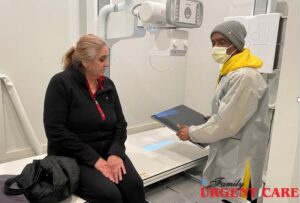Sexually transmitted diseases (STDs) and sexually transmitted infections (STIs) have been part of human society for a long time. Today, STI rates are rising, and it’s increasingly important to consistently use protection when you engage in sexual activity. Using protection and birth control should be as central to your sexual health as periodic testing.
Choosing a compassionate and discreet provider for your sexual health needs is important, and our medical team at Family Urgent Care in Chicago is here to give you the care you need. Asrar Sheik, MD, and Teofilo Vinluan, MD, offer several options for STD testing to fit your concerns and schedule. Here’s how it works.
Do I need to get tested?
When it comes to STD testing, if you’re wondering whether or not you should get tested, the safest answer is always “yes.” If you’re sexually active, you should be tested at least once per year. If you have multiple partners, you should talk with your provider at Family Urgent Care about how often you should get tested for STIs.
If you have a new sexual partner, or you’re considering skipping protection with a current partner, it’s important to get tested. Anyone could be carrying an infection without experiencing any symptoms. For this reason, it’s also important to get tested if you or your partner have multiple sexual partners. Staying vigilant is important to your sexual health.
While it’s possible to have an STI without having any symptoms, it’s more likely that an infection will make itself known, with some of the most common STIs being chlamydia, gonorrhea, and syphilis. Different infections have different symptoms, but there can be some overlap in symptoms.
Chlamydia
Chlamydia, sometimes called “the clap,” is an STI that affects your genitals. It’s characterized by several things:
- Discharge from the penis or vagina
- Painful urination
- Pain during intercourse
- Abdominal pain
Gonorrhea
Gonorrhea is an STI that affects your genitals, but can also affect your anus, eyes, mouth, or throat. Some symptoms include:
- Painful bowel movements
- Itching on or around anus
- Heavy menstrual or bleeding between cycles
- Painful, swollen testicles
Syphilis
Syphilis has a long history of affecting people across the world. Symptoms can appear on your genitals, but they can also appear anywhere on your skin, including:
- Sores anywhere on your body, including your palms and the soles of your feet
- Soreness
- Aching
- Fever
If you’re experiencing any of these symptoms, it’s important to contact your provider at Family Urgent Care for testing. Keep in mind, the above-mentioned conditions are just a few of the most common STIs. We offer testing for a full spectrum of infections so that we can protect your wellness and longevity.
What happens when I get tested?
STI testing is quick, necessary, and can be done almost anytime. When you come in for your STI testing, we will need to collect a sample of your body fluids. Which bodily fluids we collect from you will depend on the type of testing you receive. We collect a sample from you by one of several means:
- Having you urinate into a sterile cup
- A Pap smear
- A finger prick (a good way to find many STIs)
- A penal, vaginal, or anal swab
- A physical exam for any visible symptoms of an STI
After collecting a sample from you, we submit your sample to a certified lab that meets our high standards for accuracy.
Does it matter when I get tested?
When you get tested absolutely matters. Waiting to get tested for STIs raises your risk of developing complications or for your condition to develop into something more serious. Left untreated, STIs can cause a wide range of other health problems, including birth defects, neurological issues, and other debilitating consequences.
If you’ve just started a new relationship, are sexually active, or have been experiencing any symptoms of an STI, consider the team at Family Urgent Care to be your caring guide for good sexual health. Call one of our offices in either Schererville, Indiana, or Chicago, or book online with us today.
























